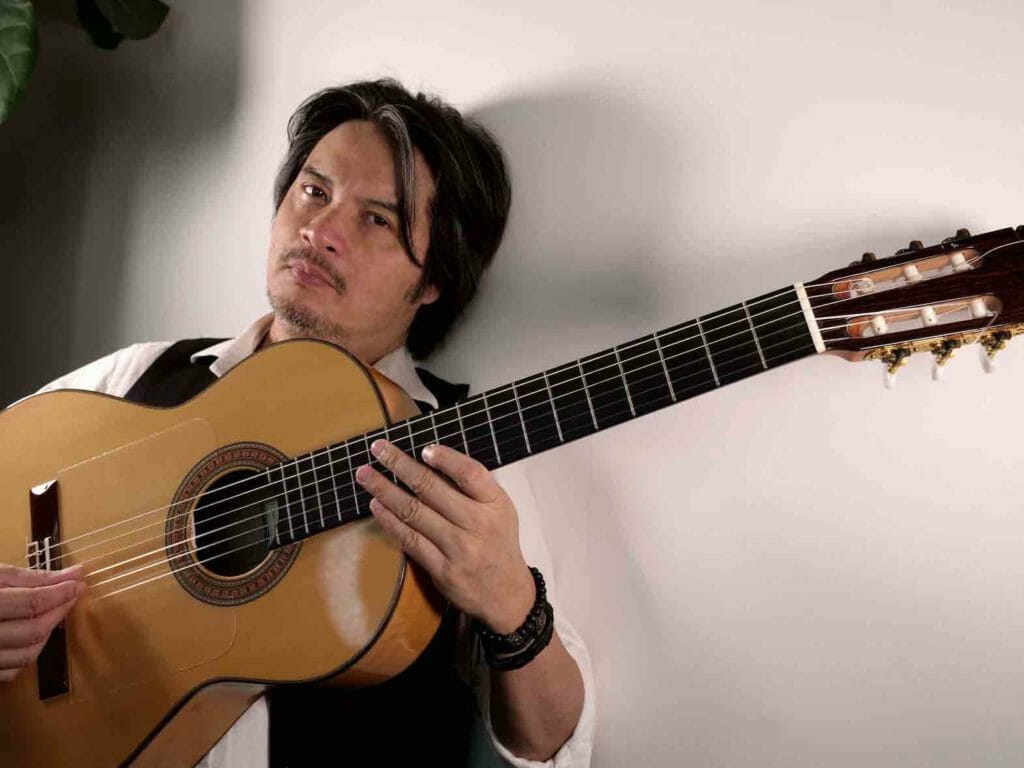Fil-Am guitarist’s album ‘Probinsya’ showcases traditional music

Filipino American classical guitarist Florante Aguilar has released his album “Probinsya.” CONTRIBUTED
SAN FRANCISCO — Filipino American classical guitarist Florante Aguilar’s new album Probinsya is a collection of songs lovingly put together in honor of his hometown Kawit, Cavite.
With painter Romeo Tabuena’s “Guitar & Birdcage” as the featured artwork, the album specifically recalls the music traditions that Aguilar’s childhood was immersed in.
The 11 tracks are a combination of folk songs and classic compositions such as “Rosa Pandan,” “Cariñosa” and “Sinisinta Kita,” among others, all arranged and performed by Aguilar.
Aguilar’s youth in the 1970s was filled with music. “My mother, Celestina Capayas Aguilar, was a pianist and I grew up hearing her play the music of Nicanor Abelardo, Antonio Molina, Francisco Santiago and other giants of 20th century Filipino music composition. If you lift the top of the piano chair, you’ll find tons of very old torn up music sheets that she collected over the years.”
He credits the elders of his hometown for introducing him to different musical traditions. “I grew up listening to harana (serenade), kundiman (torch songs) and rondalla music. They taught me to play the octavina and guitar. I became ‘the wonder kid playing with the old-timers’ during fiestas in our town. It was the best possible place for me to learn about the richness of the country’s traditional music.”
Focusing
Aguilar went on to study classical guitar performance at the University of the Philippines and eventually moved to the US to pursue further studies to hone his technique.
“I was there at EDSA during the People Power Revolution in 1986, protesting the rigged election of Marcos. I then witnessed all the chaos, the transitional government and the endless coup d’états. I knew that the instability of the Philippines was not a conducive place for me as an artist.
“It was very hard for me to reconcile focusing on classical guitar while the rest of the nation starved. I was glad to be part of toppling a dictator, but I also knew I needed a stable environment because all I really wanted to do was to master the classical guitar. At the time, I felt studying in the US was the best place for it, and that I’d have a better chance of success as a musician in the US.”
He left the year after to study guitar under a scholarship at the Manhattan School of Music and later earned a Bachelor’s in Music at the San Francisco Conservatory of Music.
Champion
Now based in Napa Valley, Aguilar has been championing Filipino traditional music through his albums and work in film and theater.
He composed and cowrote the libretto of “Aswang the Concert: Mga Kuwentong Halimaw, Their True Stories,” a dramatized song cycle featuring Philippine mythical creatures such as manananggal, tikbalang, syokoy and tumao.
He is also a frequent collaborator with San Francisco-based performance group Kularts, composing music for their performances.
He is coproducer of documentary Harana: The Search for the Lost Art of Serenade, where Aguilar interviewed and collaborated with three haranistas from remote provinces in the Philippines.
Homage
Aguilar recalls receiving a bicycle from his father when he was 10. “I explored the other barangays of Kawit. I loved riding my bike, seeing the open rice fields, discovering places, enjoying beautiful sunsets over the irasan (salt beds). The salt-making industry was huge then.
The last time he visited Kawit was 14 years ago. “It looked very different. It didn’t feel like a probinsya anymore. It [had become] well-developed and modernized.
“I think that is why I hold on to the romantic image of my hometown. It is gone. Playing traditional music is my way of paying homage to that bygone era.”
“At its heart, what influences the Probinsya album is appreciation of traditional music. I saw the way the elders listened to and practiced this kind of music in a devoted way. They talked about the best kundiman singers, the legends of harana, and they had encyclopedic knowledge of the repertoire. To my young mind, they were such virtuosos of the rondalla. You could say that the album is actually rondalla music arranged and played on the classical guitar.”
“Probinsya” is released by New Art Media Chicken Coop Productions and is available on music streaming services. Visit floranteaguilar.com.

